
NAKED VIOLENCE
Color, 1969, 96m.
Directed by Fernando Di Leo
Starring Pier Paolo Capponi, Susan Scott, Michel Bardinet, Marzio Margine
SHOOT FIRST, DIE LATER
Color, 1974, 94m.
Directed by Fernando Di Leo
Starring Luc Merenda, Richard Conte, Delia Boccardo, Raymond Pellegrin, Salvo Randone
KIDNAP SYNDICATE
Color, 1975, 98m.
Directed by Fernando Di Leo
Starring Luc Merenda, James Mason, Irina Maleeva, Marino Masé, Valentina Cortese, Marino Masé, Marco Liofredi
Raro (Blu-Ray & DVD) (US R0 NTSC, Italy R0 PAL) / WS (1.85:1) (16:9)
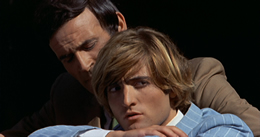 Following their release of an excellent quartet of films by crime film specialist Fernando Di Leo,
Following their release of an excellent quartet of films by crime film specialist Fernando Di Leo, 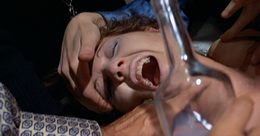 Raro Video follows up with three more solid efforts from a director now far more popular than he was in his theatrical heyday. As usual the films are presented chronologically, though that may not be the best for newcomers to watch them; instead, try them in reverse order and the results will probably be a lot more satisfying.
Raro Video follows up with three more solid efforts from a director now far more popular than he was in his theatrical heyday. As usual the films are presented chronologically, though that may not be the best for newcomers to watch them; instead, try them in reverse order and the results will probably be a lot more satisfying.
First up we have Di Leo's savage final film of the 1960s, Naked Violence, (originally titled I ragazzi del massacro, or "Massacre Boys"), a combination of delinquent teen potboiler and cop procedural for his atypical sole directorial dabble in the giallo genre, Slaughter Hotel. The opening credits are barely underway before we're confronted with the image of a schoolteacher being sexually assaulted and murdered in the classroom by her pupils, and it's up to the cop in charge, Inspector Liberti (The Cat o' Nine Tails' Capponi), to grill the youths and find out who was in charge of the crime. An empty bottle of psychotropic booze (85 proof) was found at the scene ("If a kid touches a drop, he's drunk... It burns your nervous system"), and each teen protests his innocence and claims he was a helpless bystander, refusing to buckle even when they're forced to sit in a wooden chair soaked in liquor. Liberti manages to pinpoint one "different" boy who could be the weak link and teams up with a social worker, Livia (giallo regular Scott with an unflattering hairdo), to find out whether someone else goaded the boys into the attack.
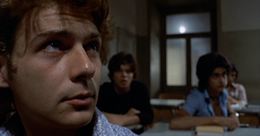 Dark, oppressive, and brutal, this is an angry film tempered by some welcome touches of melodrama like the exaggerated musical stings each time a new boy enters the interrogation room. In the Pasolini tradition, many of the kids on the screen were apparently real-life juvenile offenders, which lends the film an extra layer of queasy realism. There's also more edgy content on display than you'd probably expect, with intimations of drug abuse and prostitution, though the big reveal at the end leaves a bit of a nasty taste in the mouth and will probably annoy more than a few viewers. What definitely still works is the atmosphere, a fetid world in which everything is shot in queasy close ups with a climactic flashback almost too intense to watch.
Dark, oppressive, and brutal, this is an angry film tempered by some welcome touches of melodrama like the exaggerated musical stings each time a new boy enters the interrogation room. In the Pasolini tradition, many of the kids on the screen were apparently real-life juvenile offenders, which lends the film an extra layer of queasy realism. There's also more edgy content on display than you'd probably expect, with intimations of drug abuse and prostitution, though the big reveal at the end leaves a bit of a nasty taste in the mouth and will probably annoy more than a few viewers. What definitely still works is the atmosphere, a fetid world in which everything is shot in queasy close ups with a climactic flashback almost too intense to watch.
Released on DVD in Italy several years ago in an English-friendly edition, Naked Violence makes the leap to Blu-Ray and understandably looks the weakest of this trio. It's a very gritty, soft film with a murky aesthetic throughout, but the Blu-Ray benefits considerably from the lack of severe compression on the DVD; just don't expect much of a difference in other areas as it basically looks like a decent upconversion. The Italian and English tracks are presented in LPCM 2.0 mono with optional English subtitles (translated from the Italian version, not dubtitles). The Italian track is really the way to go as it matches the actors' performances and feels much more natural, while the English one is incomplete (with Italian subbed passages inserted for the missing dialogue) and features a weird mishmash of flat American and cockney English accents. The first video extra is "Those Good Fellas" (amusingly listed erroneously as simply "Goodfellas" on the packaging), an 18-minute video interview with Capponi, Di Leo (in vintage footage), Maurizio Colombo, Luca Crovi, and Franco Lo Cascio, with Capponi getting the vast majority of the running time as he runs down his own experiences with Di Leo on both this and future films. "Fernando Di Leo at the Cinematheque" offers a 15-minute chat with Jean-Francois Rauger of the Cinematheque Francaise and programmer Olivier Pere about Di Leo's place in the canon of Italian cult figures being rediscovered including their personal favorites and the perspectives on Italian society they present.
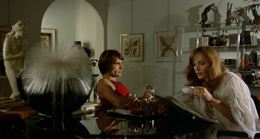 Next up is one of the rarest and best of Di Leo's cop epics, Shoot First, Die Later, the only one previously released by Raro on Blu-Ray (a mere three months earlier). Originally titled Il poliziotto è marcio, this is the seedy story of a cop named Dominic (Torso's Merenda), a lieutenant who isn't above taking some money from crime rings. Figuring the system is a compromise anyway, he makes occasional token busts but doesn't do much to tick off the syndicate members, first seen
Next up is one of the rarest and best of Di Leo's cop epics, Shoot First, Die Later, the only one previously released by Raro on Blu-Ray (a mere three months earlier). Originally titled Il poliziotto è marcio, this is the seedy story of a cop named Dominic (Torso's Merenda), a lieutenant who isn't above taking some money from crime rings. Figuring the system is a compromise anyway, he makes occasional token busts but doesn't do much to tick off the syndicate members, first seen 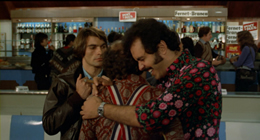 blowing out the shins and kneecaps of some unfortunate underlings in the brutal opening scene. Dominic keeps a respectable front on for his proud dad (Randone) when he isn't dealing with Spanish thugs in bowling alleys and slipping money back and forth on the side with Sicilian thugs. He also finds a girlfriend in Sandra (Tentacles' Boccardo), who seems to have a rooting interest in furthering his career. Unfortunately when the mobsters force Dominic to ferret out a crucial police report from his dad, his time on the take might be coming to an end.
blowing out the shins and kneecaps of some unfortunate underlings in the brutal opening scene. Dominic keeps a respectable front on for his proud dad (Randone) when he isn't dealing with Spanish thugs in bowling alleys and slipping money back and forth on the side with Sicilian thugs. He also finds a girlfriend in Sandra (Tentacles' Boccardo), who seems to have a rooting interest in furthering his career. Unfortunately when the mobsters force Dominic to ferret out a crucial police report from his dad, his time on the take might be coming to an end.
Shoot First, Die Later was made at the height of Di Leo's directorial powers, in between his other better known films like The Boss and Rulers of the City. It's also the darkest and most cynical of the bunch, with an antihero who anticipates the corrupt pair at the heart of 1976's Live like a Cop, Die like a Man. Even more fascinating is the film's striking similarity at times to William Friedkin's To Live and Die in L.A. made over ten years later, which at moments feels almost like an Americanized remake. The only hiccup is a final text postscript that was most likely added to appease the censors (basically a "crime doesn't pay" message), which would've been better left off. This also marked the first time Di Leo worked with Merenda, a reliable action star; they immediately hit it off and would reunite again. As usual he's good here, playing a role that might have been completely reprehensible in another actor's hands. He really has to anchor the film from start to finish, with great support coming from a pulsating music score by genre regular Luis Bacalov.
Perhaps due to its dark nature, this film was distributed far less widely than most Italian cop movies at the time and only made a couple of token appearances on VHS in Europe. Its reputation has primarily survived through extremely shoddy bootleg copies, which you can thankfully toss aside with the availability of the Raro release transferred from the original negative. The image quality is extremely good; there's no weird digital splotching here that you'll find in some other, now infamous Italian-based HD transfers. The opening titles look a generation or so softer than the rest of the film, presumably because of the opticals involved, and the colors 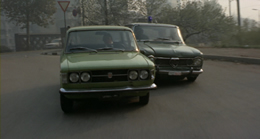 and detail look very good given the fact that this isn't the prettiest movie in the world. Audio is presented in PCM two-channel mono in both English and Italian; either one works, really, since it's lopped either way. Merenda appears to be speaking almost all of his lines in English along with some of the other cast, while others were speaking Italian (or, by the looks of it, something else entirely). The English
and detail look very good given the fact that this isn't the prettiest movie in the world. Audio is presented in PCM two-channel mono in both English and Italian; either one works, really, since it's lopped either way. Merenda appears to be speaking almost all of his lines in English along with some of the other cast, while others were speaking Italian (or, by the looks of it, something else entirely). The English 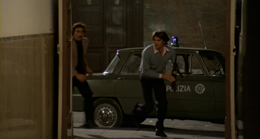 dub features many familiar voices from '70s Italian cinema (Argento fans in particular will be amused), while the Italian track is definitely classier and a bit more natural. The one black mark is the optional English subtitles, which are basically dubtitles instead of a direct translation of the Italian dialogue. Even more egregiously, they translate the main character's name as "Dominique," which is, well, a bit unfortunate.
dub features many familiar voices from '70s Italian cinema (Argento fans in particular will be amused), while the Italian track is definitely classier and a bit more natural. The one black mark is the optional English subtitles, which are basically dubtitles instead of a direct translation of the Italian dialogue. Even more egregiously, they translate the main character's name as "Dominique," which is, well, a bit unfortunate.
The most substantial of the extras is a pair of new featurettes courtesy of Nocturno Cinema (who created some of Raro's best prior extras). "Master of the Game" (24 minutes) and "The Second Round of the Game" (21 minutes) feature a taped interview with Di Leo (probably dating back to the late director's work on the other Raro titles), interspersed with comments from critics and colleagues. The focus here is really his entire crime cycle, with film clips illustrating his views on both filmmaking and the Italian criminal justice system. Also included are the Italian and English theatrical trailers and a substantial liner notes booklet (which barely mentions the other two films in the set) including an introduction about the film's connection to William McGivern's novel Rogue Cop, notes about the production and cast, an essay on actor and stunt man Gilberto Galimberti, and a fascinating piece about a thwarted project Di Leo 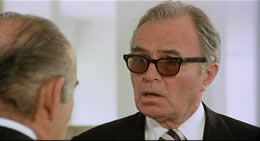 was going to make with his idol, Le Samourai director Jean-Pierre Melville. Imagine the possibilities.
was going to make with his idol, Le Samourai director Jean-Pierre Melville. Imagine the possibilities.
Finally we reach the third film in the set and probably the most under appreciated, Kidnap Syndicate, with Merenda returning (just after his starring roles in Gambling City and the giallo Puzzle). Here he plays a gun-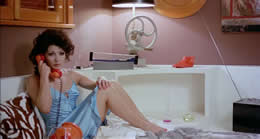 toting vigilante instead of a cop courtesy of the role of Mario, a widower motorcycle mechanic who's raising his young son, Fabrizio (Liofredi). The two have a good rapport together, and Fabrizio is such a good kid he even steps in when one of his much richer classmates, Antonio, is abducted by thugs in ski masks. Unfortunately they toss Fabrizio in the car, too, and wind up holding both boys for an exorbitant ransom to be paid by Antonio's parents, the Filippinis (Mason and Cortese). When the police prove to be unhelpful and the situation takes a violent turn, Mario is forced to take matters into his own hands -- even if it means mowing down criminals in a hail of bullets.
toting vigilante instead of a cop courtesy of the role of Mario, a widower motorcycle mechanic who's raising his young son, Fabrizio (Liofredi). The two have a good rapport together, and Fabrizio is such a good kid he even steps in when one of his much richer classmates, Antonio, is abducted by thugs in ski masks. Unfortunately they toss Fabrizio in the car, too, and wind up holding both boys for an exorbitant ransom to be paid by Antonio's parents, the Filippinis (Mason and Cortese). When the police prove to be unhelpful and the situation takes a violent turn, Mario is forced to take matters into his own hands -- even if it means mowing down criminals in a hail of bullets.
A crackerjack action film in its own right, Kidnap Syndicate is special in Di Leo's filmography for the unusual emotional foundation laid over the first half of the story. Merenda really gets to stretch here in one of his finest roles as a blue collar dad forced into extreme circumstances beyond his control, and though he doesn't have much screen time, the icy Mason and always excellent Cortese are perfectly cast and give their roles some much-needed gravitas. Obviously the set up is a throwback to Akira Kurosawa's High and Low, but the  plot twists are very, very different and the second half is pure Italian crime material complete with motorcycle chases and some very violent shootings. It's an impressive balance of thrills and substance, and while we once again have a slightly tacked-on bit of morality tacked on at the very end (via a sound effect), it's clear where the audience's sympathies are supposed to lie.
plot twists are very, very different and the second half is pure Italian crime material complete with motorcycle chases and some very violent shootings. It's an impressive balance of thrills and substance, and while we once again have a slightly tacked-on bit of morality tacked on at the very end (via a sound effect), it's clear where the audience's sympathies are supposed to lie.
Originally released on Italian DVD by Raro, Kidnap Syndicate looks great in HD and appears to be sourced from the negative just like the prior release. That means the main and end titles are obviously spliced in from an inferior 35mm Italian print, but 95% of the film is in terrific shape. (Please note, HD frame grabs weren't obtainable on this particular disc as of this writing, but they will be posted as soon as possible.) Audio is again presented in LPCM mono in Italian and English (with optional English subs for the Italian version), but this time it's a toss up over which one is preferable. The English dub is well done and Mason speaks with his own voice (in synch most of the time), but the Italian one is generally more legitimate for everyone else. Heck, try 'em both. As for extras, the 28-minute "Violent Cities: The Other Fernando Di Leo Trilogy" features Merenda, producer Armando Novelli, actress Dagmar Lassander, and editor Amedeo Giomini discussing working with Di Leo (who also shows up briefly over the closing credits), with Merenda (who, not surprisingly, gets most of the coverage) sharing some effective anecdotes about drawing on his own personal tragedies. Included are some clips from Nick the Sting, which will hopefully come along in Volume 3 one of these days.
Reviewed on July 12, 2013.



 Following their release of an excellent quartet of films by crime film specialist Fernando Di Leo,
Following their release of an excellent quartet of films by crime film specialist Fernando Di Leo,  Raro Video follows up with three more solid efforts from a director now far more popular than he was in his theatrical heyday. As usual the films are presented chronologically, though that may not be the best for newcomers to watch them; instead, try them in reverse order and the results will probably be a lot more satisfying.
Raro Video follows up with three more solid efforts from a director now far more popular than he was in his theatrical heyday. As usual the films are presented chronologically, though that may not be the best for newcomers to watch them; instead, try them in reverse order and the results will probably be a lot more satisfying. Dark, oppressive, and brutal, this is an angry film tempered by some welcome touches of melodrama like the exaggerated musical stings each time a new boy enters the interrogation room. In the Pasolini tradition, many of the kids on the screen were apparently real-life juvenile offenders, which lends the film an extra layer of queasy realism. There's also more edgy content on display than you'd probably expect, with intimations of drug abuse and prostitution, though the big reveal at the end leaves a bit of a nasty taste in the mouth and will probably annoy more than a few viewers. What definitely still works is the atmosphere, a fetid world in which everything is shot in queasy close ups with a climactic flashback almost too intense to watch.
Dark, oppressive, and brutal, this is an angry film tempered by some welcome touches of melodrama like the exaggerated musical stings each time a new boy enters the interrogation room. In the Pasolini tradition, many of the kids on the screen were apparently real-life juvenile offenders, which lends the film an extra layer of queasy realism. There's also more edgy content on display than you'd probably expect, with intimations of drug abuse and prostitution, though the big reveal at the end leaves a bit of a nasty taste in the mouth and will probably annoy more than a few viewers. What definitely still works is the atmosphere, a fetid world in which everything is shot in queasy close ups with a climactic flashback almost too intense to watch.  Next up is one of the rarest and best of Di Leo's cop epics, Shoot First, Die Later, the only one previously released by Raro on Blu-Ray (a mere three months earlier). Originally titled Il poliziotto è marcio, this is the seedy story of a cop named Dominic (Torso's Merenda), a lieutenant who isn't above taking some money from crime rings. Figuring the system is a compromise anyway, he makes occasional token busts but doesn't do much to tick off the syndicate members, first seen
Next up is one of the rarest and best of Di Leo's cop epics, Shoot First, Die Later, the only one previously released by Raro on Blu-Ray (a mere three months earlier). Originally titled Il poliziotto è marcio, this is the seedy story of a cop named Dominic (Torso's Merenda), a lieutenant who isn't above taking some money from crime rings. Figuring the system is a compromise anyway, he makes occasional token busts but doesn't do much to tick off the syndicate members, first seen  blowing out the shins and kneecaps of some unfortunate underlings in the brutal opening scene. Dominic keeps a respectable front on for his proud dad (Randone) when he isn't dealing with Spanish thugs in bowling alleys and slipping money back and forth on the side with Sicilian thugs. He also finds a girlfriend in Sandra (Tentacles' Boccardo), who seems to have a rooting interest in furthering his career. Unfortunately when the mobsters force Dominic to ferret out a crucial police report from his dad, his time on the take might be coming to an end.
blowing out the shins and kneecaps of some unfortunate underlings in the brutal opening scene. Dominic keeps a respectable front on for his proud dad (Randone) when he isn't dealing with Spanish thugs in bowling alleys and slipping money back and forth on the side with Sicilian thugs. He also finds a girlfriend in Sandra (Tentacles' Boccardo), who seems to have a rooting interest in furthering his career. Unfortunately when the mobsters force Dominic to ferret out a crucial police report from his dad, his time on the take might be coming to an end. and detail look very good given the fact that this isn't the prettiest movie in the world. Audio is presented in PCM two-channel mono in both English and Italian; either one works, really, since it's lopped either way. Merenda appears to be speaking almost all of his lines in English along with some of the other cast, while others were speaking Italian (or, by the looks of it, something else entirely). The English
and detail look very good given the fact that this isn't the prettiest movie in the world. Audio is presented in PCM two-channel mono in both English and Italian; either one works, really, since it's lopped either way. Merenda appears to be speaking almost all of his lines in English along with some of the other cast, while others were speaking Italian (or, by the looks of it, something else entirely). The English  dub features many familiar voices from '70s Italian cinema (Argento fans in particular will be amused), while the Italian track is definitely classier and a bit more natural. The one black mark is the optional English subtitles, which are basically dubtitles instead of a direct translation of the Italian dialogue. Even more egregiously, they translate the main character's name as "Dominique," which is, well, a bit unfortunate.
dub features many familiar voices from '70s Italian cinema (Argento fans in particular will be amused), while the Italian track is definitely classier and a bit more natural. The one black mark is the optional English subtitles, which are basically dubtitles instead of a direct translation of the Italian dialogue. Even more egregiously, they translate the main character's name as "Dominique," which is, well, a bit unfortunate. was going to make with his idol, Le Samourai director Jean-Pierre Melville. Imagine the possibilities.
was going to make with his idol, Le Samourai director Jean-Pierre Melville. Imagine the possibilities. toting vigilante instead of a cop courtesy of the role of Mario, a widower motorcycle mechanic who's raising his young son, Fabrizio (Liofredi). The two have a good rapport together, and Fabrizio is such a good kid he even steps in when one of his much richer classmates, Antonio, is abducted by thugs in ski masks. Unfortunately they toss Fabrizio in the car, too, and wind up holding both boys for an exorbitant ransom to be paid by Antonio's parents, the Filippinis (Mason and Cortese). When the police prove to be unhelpful and the situation takes a violent turn, Mario is forced to take matters into his own hands -- even if it means mowing down criminals in a hail of bullets.
toting vigilante instead of a cop courtesy of the role of Mario, a widower motorcycle mechanic who's raising his young son, Fabrizio (Liofredi). The two have a good rapport together, and Fabrizio is such a good kid he even steps in when one of his much richer classmates, Antonio, is abducted by thugs in ski masks. Unfortunately they toss Fabrizio in the car, too, and wind up holding both boys for an exorbitant ransom to be paid by Antonio's parents, the Filippinis (Mason and Cortese). When the police prove to be unhelpful and the situation takes a violent turn, Mario is forced to take matters into his own hands -- even if it means mowing down criminals in a hail of bullets. plot twists are very, very different and the second half is pure Italian crime material complete with motorcycle chases and some very violent shootings. It's an impressive balance of thrills and substance, and while we once again have a slightly tacked-on bit of morality tacked on at the very end (via a sound effect), it's clear where the audience's sympathies are supposed to lie.
plot twists are very, very different and the second half is pure Italian crime material complete with motorcycle chases and some very violent shootings. It's an impressive balance of thrills and substance, and while we once again have a slightly tacked-on bit of morality tacked on at the very end (via a sound effect), it's clear where the audience's sympathies are supposed to lie. ![]()